Forbidden Broadway: Behind the Mylar Curtain (134 page)
Read Forbidden Broadway: Behind the Mylar Curtain Online
Authors: Gerard Alessandrini,Michael Portantiere

Not surprisingly, the numbers that worked
best in Forbidden Hollywood were somehow related to Broadway. "Hits and Bombs"
spoofed Guys and Dolls and other ridiculous
stage-to-screen transfers, like Hello, Dolly!
My personal favorite sequence was all about
the bizarre overuse of color filters in the film
version of South Pacific; changing "Bali H'ai"
to "Blurry Hues" hit the bull's-eye. Likewise
Audrey Hepburn in My Fair Lady singing "Dub Me" (to the tune of "Show Me"), with
the assistance of Marni Nixon. An ancient Marlene Dietrich (the magnificent Susanne
Blakeslee) sang one of my nastiest parodies, "Falling Apart Again." And Liza (Christine
Pedi), in Weimar Republic-era hot pants and a Fosse bowler hat, bemoaned the loss
of her Hollywood star power in "Bye-Bye, Mein Film Career."
Even though Forbidden Hollywood wasn't embraced by the public as Forbidden
Broadway had been, I loved writing and directing it with the enthusiastic help of Phill
George. Alvin Colt had a field day creating the fabulous, witty costumes. The original
cast of Forbidden Hollywood also included Jason Graae-"the brilliant actor with too
many vowels in his last name," as Phill would say-and Mr. Super Personality, Gerry
McIntyre. Brad Ellis was the original musical director. I had worked with him for years,
and we spoke the same creative language. It was a dream to collaborate with all these
mega-talented people.
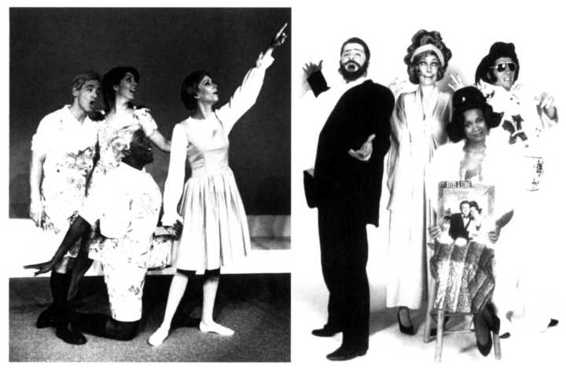
Left: Jason Graae, Christine Pedi, Gerry McIntyre, and Susanne Blakeslee relocate to Vermont for the ultimate
movie sequel, The Sound of Music: Part /l, in Forbidden Hollywood. Right: Michael McGrath (as Pavarotti),
Susanne Blakeslee (as Barbra Streisand circa 1966), Mary Denise Bentley (as Eydie Gorme), and Herndon Lackey
(as Elvis circa 1976) in Forbidden Christmas.
Another spin-off I loved writing was Forbidden Christmas. In the 1980s, while Forbidden Broadwaywas playing in Boston and we were using that production to try out
new numbers, I very much wanted to attempt a Christmas show. It seemed logical,
because so many musicals had Christmas references or songs, and also because so
many people attend the theatre at holiday time.
Changing "We Need a Little Christmas" (from Mame) to "We Need a Broadway
Christmas" and mixing the holiday festivities with parodies of stage celebrities was
a blast. We also spoofed recording stars such as Frank Sinatra, Barbra Streisand, and
Elvis Presley inappropriately performing Christmas carols. (We had Elvis sing "White
Christmas," and he would rub his nose after the word "white." The audience howled at
the cocaine reference, but after a few performances, someone from the Berlin estate
called me and said, "You take that bit out of the show immediately!")
The Christmas show even took a little dip into the opera world when we had Luciano
Pavarotti sing "0 Holy Note." It was a bit sacrilegious, but also hysterically funnyespecially when Luciano hit his high C and shattered the eyeglasses of the altar boys
in attendance. We have continued to present the Christmas version of the show on
and off for years.
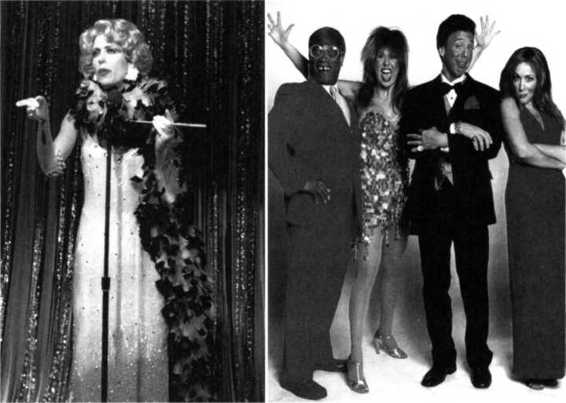
Left: Susanne Blakeslee as Marlene Dietrich in Forbidden Hollywood. Right: The company of
Forbidden Vegas: Eric Lee Johnson, Valerie Fagan, Michael West, and Carter Calvert.
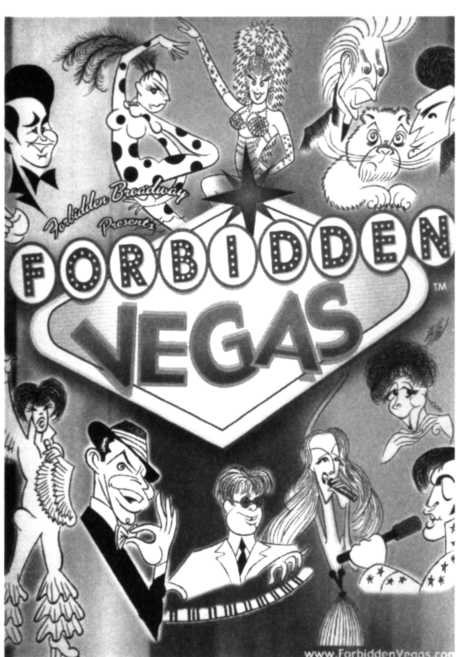
Our third and final spin-off was Forbidden Vegas,
which premiered in that world-famous tourist mecca
at the Weston Casarina Hotel off "the strip." As Pete
Blue, who worked on the show, pointed out, the venue
seemed like a tornado had picked up a Weston hotel in
Idaho and dropped it in the middle of Vegas; the place
had a definite Midwestern feel about it. We targeted the
obvious subjects-Celine Dion, Elton John, Steve and
Eydie, and the Blue Man Group-along with classic Vegas acts like Frank Sinatra and Wayne Newton.
The Forbidden Broadway sequels met with varying
degrees of success in various cities. We still occasionally
do new editions of the Hollywood and Christmas shows.
And, who knows, I may get around to Forbidden Opera
someday-that is, if I don't have a problem with the
Puccini estate. Maybe Andrew Lloyd Webber can help
us get the music rights?
It's very simple to create your own parody lyric. You too can be a plagiarist alongside
many of the greats! Just follow these simple instructions. This formula doesn't date,
so you can use it for any show or any star at any time. Start by selecting a well-known,
catchy show tune, then choose and insert names and words as follows:
[INSERT NAME OF STAR OR FAMOUS BROADWAY CHARACTER]
[Sings blissfully. ]
I'M [insert name of star]
YOU PROBABLY KNOW ME AS [insert star's most famous
theatrical, film, or TV rolel
I [write something dishy about someone with whom the star
has worked]
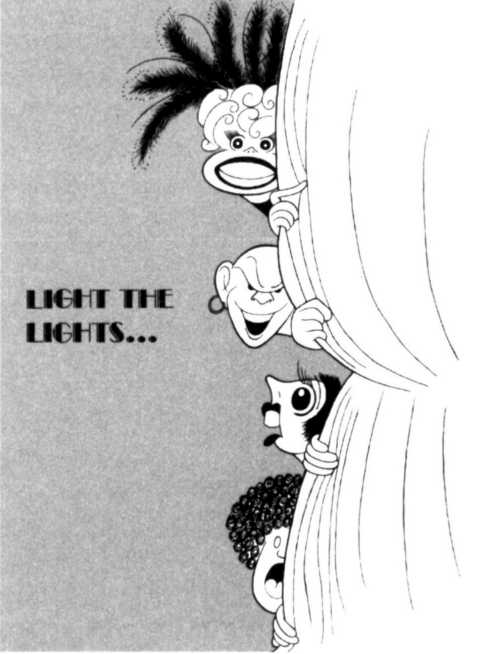
WE [rhyme with a clever word]
I AM [choose one]
(a) too old
(b) too fat
(c) too dead
THAT'S WHY I ALWAYS WANTED TO [insert a vicious crime or
nasty thought]
BROADWAY ISN'T WHAT IT USED TO BE; I LONG FOR THE DAYS WHEN ACTORS [choose one]
(a) sang better
(b) projected clearer
(c) had decent scripts
AND DANCED LIKE [choose one]
(a) Bob Fosse
(b) Michael Bennett
(c) Jerome Robbins
BUT I LOVE BROADWAY ANYWAY,'CAUSE TI IERE'S
(a) no tune like a show tune
(b) no business like show business
(c) no way I'm gonna get a job anywhere else
]End by raising your hands above your head for the last, big high note, or drop dead on the musical
button. Blackout.]
When we first did Forbidden Broadway at Palsson's Supper Club, I went to BMI for
advice, and someone there said, "First of all, you can't just use other people's music
in your show!" I said, "But we're already doing that." He said, "But you won't he able
to open." I said, "We're already open, and we're
playing to packed houses every night." He said,
"But you can't do that." Lehman Engel came
into the office and said, "You idiot, haven't you
read the rave review in the New York Times?
The show is a hit! Sign him up and get him the
rights!"
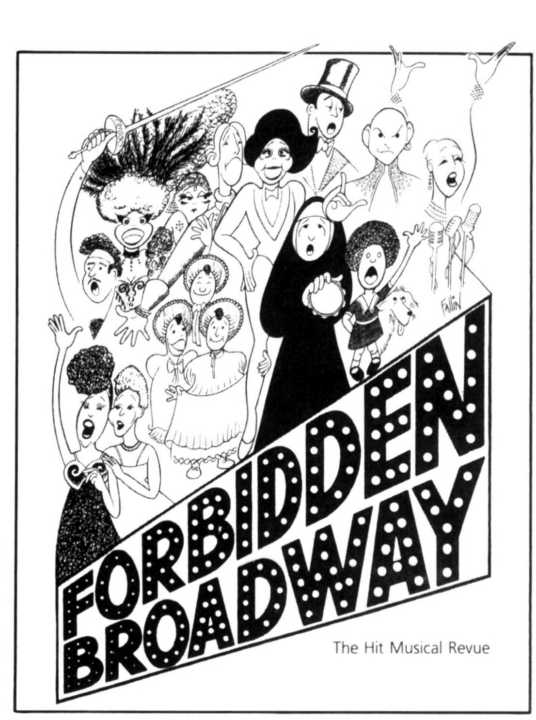
Ken Fallin's art for the back cover of our original OffBroadway cast album.
Lehman and Maurice Levine helped us a lot
with the music rights, but I think even more
important was the fact that people like Stephen
Sondheim, Comden and Green, Kander and
Ebb, Jerry Herman, and Sheldon Harnick saw
the show early on. They enjoyed it, they knew
exactly what we were doing, and they certainly
didn't want to stop the show. So Lehman and
Maurice advised us to basically go to the publishers and lease each of the original songs for
use in our show, which is what we ended up
doing. I'm very grateful for their assistance; if
it hadn't been for them, Forbidden Broadway
might not have continued.
A rumor arose that Andrew Lloyd Webber
denied us use of his songs for our parodies,
forcing us to rewrite the melodies, but that's not accurate. When the show moved to Theatre East, Jonathan Scharer, our producer
there, wanted to get contracts for every song in the show, and we just couldn't get the
contracts for the Lloyd Webber material signed in time for the opening. So, for a while,
we used a homemade pastiche tune for the Phantom sequence. But we did eventually get the rights squared away, and from then on we were able to use the original
melodies. Actually, Lloyd Webber has been one of our show's biggest fans from the
beginning. In fact, in 1982, the cast went and performed our Cats and Evita numbers
for him at his birthday party.
